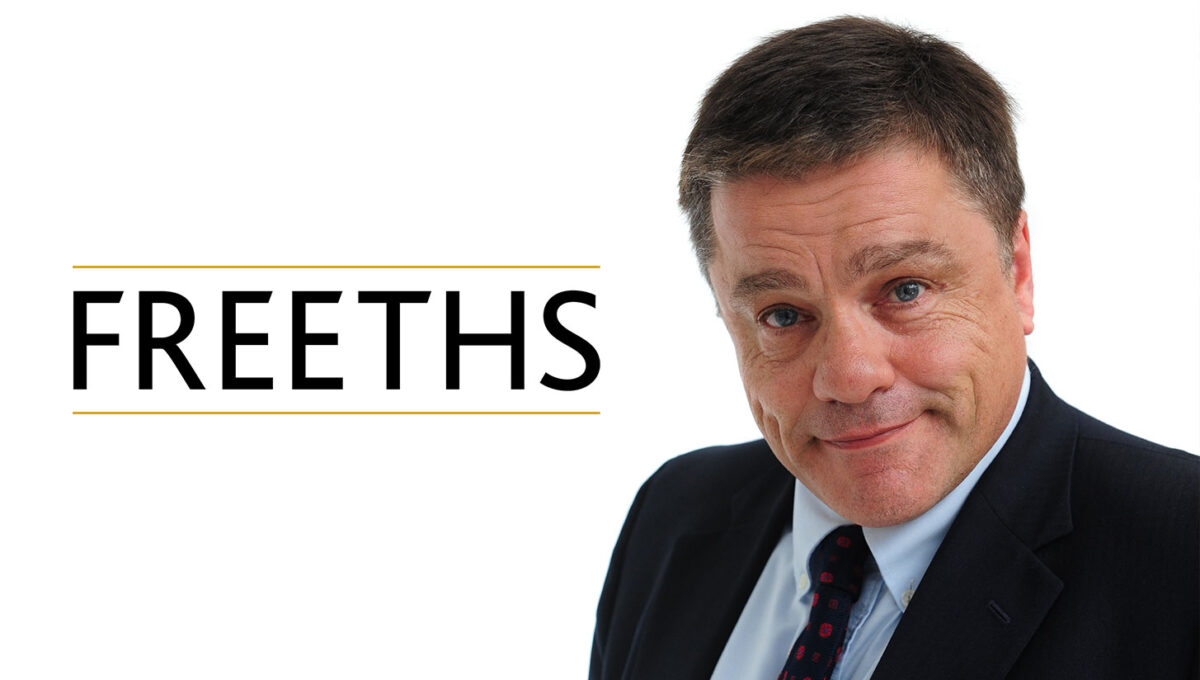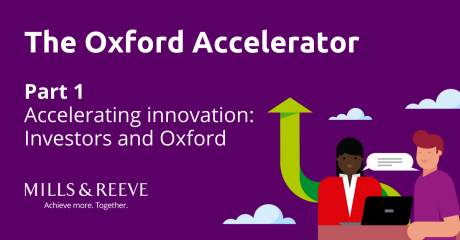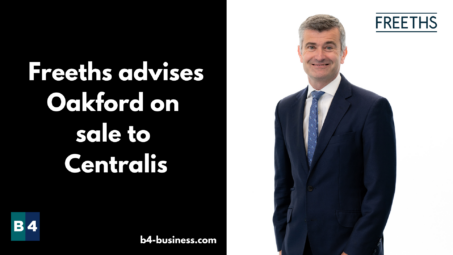
Freeths LLP win £25M VAT appeal against HMRC for Sintra Global
We spoke to Simon Ellis who represents Freeths LLP, who recently won a £25 million VAT appeal for Mr Malde of Sintra Global against HMRC.
Congratulations for winning the case against HMRC for Mr Malde. The case lasted about 9 years?
Thank you, it was something of a long struggle. The investigation of Mr Maldecommenced roundabout 2013. HMRC began to investigate his connection with two overseas companies called Sintra SA and Sintra Global, who they suspected of smuggling alcohol into the UK in industrial volumes. The investigation lasted two years with several interviews with Mr Malde, and then in July 2015 HMRC applied to the High Court for a worldwide freezing injunction over all of Mr Malde’s assets including his family home, various other properties, all of his companies and effectively limited him to a very limited amount of living expenses, and then subsequently they raised assessment in terms of excise duty and VAT which they suggested the companies owed to the tune of roundabout £25 million. They also raised personal penalties against Mr Malde as the alleged Director of the company, so yes, starting in 2013 and finishing about a month ago.
Could you speak a bit more about your overall role, it was your case?
Yes, I took over conduct of the case, not quite at the beginning, but in 2016 when the assessments were levied. From a personal point of view, it was an enormous amount of work. You kind of had to live and breathe it for the best part of five years because of the sheer volume of material that was thrown at you.
It was very costly for Mr Malde because in essence has over 5 years of commitments to legal fees. From his personal point of view, just before the freezing injunction landed, he had moved out of his house to what was anticipated to be a brief renovation period, he hasn’t been able to return yet, so it has been both a rollercoaster as well as deeply time-consuming. Effectively, I’ve lived in this case for five years.
That must be a huge weight off your shoulders?
It is to some extent, HMRC of course are perfectly at liberty to appeal the decision, they haven’t done so as of yet, but they have until 30th November before they have to make that decision, so we may not be finished yet. Certainly, it has been a very gratifying result because, whilst it might well be said that the accusations against Mr Malde do not put him in a particularly great light, there is an obligation on the government to play fairly, and for this case it appears they have not.
What were your initial thoughts when you first heard about this case?
The first piece of evidence that we received was an affidavit that had been made by the senior HMRC officer in the case, that had been used to put to the high court in order to obtain the freezing of Mr Malde’s assets. That was over 250 pages in length and there were literally thousands of documents exhibited to him. If you take it at face value there are certain question marks that arise from it, but it looked very much as though the revenue had a powerful case. The only thing you can do in cases like this is to test that, by what is effectively a forensic examination of all the documents. It became clear as time went by and we got further and further into that exercise that there were quite a lot of gaps that had been brushed over. That focused our attention in obtaining the relevant evidence. We were able to offer some of our own evidence which they basically ignored, but it was the disclosure exercise that proved critical to getting the information that showed in the judge’s words, that HMRC had taken a ‘myopic’ view of this matter.
How did they get to the £25 million figure?
They obtained bank statements, and this is a relatively complicated and perhaps surprising approach. They alleged that Mr Malde’scompany Sintra SA, which was a company situated in Panama, basically was supplied by another company in the UK, called Your Wines. Your Wines is fair to say were convicted of activities not involving Sintra SA,but other customers of tax fraud. However, HMRC basically took the payments that were received by this company Your Wines from Sintra SA and said all of those were proceeds of alcohol smuggling.
They also took a number of courier notes which showed cash payments from Sintra SAor other companies to Your Wines and then they used what was called a best judgement analysis which means they look, or they should look, at all of the information before them to come to a figure. They assumed that 65 percent of the amount of payments made by Sintra SA to Your Wines were in cash, which would have effectively meant that various couriers would have has to cross the channel from Europe to the UK carrying as much as £200,000 thousand in their back pocket two or three times a week, which seemed to us a somewhat improbable suggestion and the tribunal did agree with us.
Effectively the best way to summarise it is to simply say, HMRC believed there was fraudulent activity going on. They then used the information they had to the highest possible level of fraudulent activity and sort financial compensation at the highest possible level they could have, without really any from of consideration of the eviece. For instance, it came out of the trial that the officer who calculated the assessment had looked at the bank statements and counted things like the supply of office furniture as a sale of alcohol, when it’s quite clear in the bank statements that it’s not.
Did you find the case unusual?
I’ve done a number of very large cases that HMRC have brought, this one was unusual in the sense that it appears, and this is what the tribunal actually found, that HMRC had arrived at a pre-fixed idea of what had happened, and then had looked for evidence to substantiate that. As a result, they started at the end and then tried to work back to the beginning, excluding evidence, and didn’t produce anything that was contrary to their view of what had actually happened. During the case, and literally there were over 100,000 individual documents that were put forward as evidence, with over 50 witnesses in total, we made applications to the tax tribunal that was hearing the case for disclosure documents that HMRC had not put forward.
The disclosure exercise commenced around the time of the first lockdown. There were delays because, quite properly, HMRC were unable to access certain documents in storage, but it took almost a year and a half of visits to the tribunal to get an order that they produced, so almost two years to get the information out of them.
When that was done, a somewhat contradictory picture emerged and it transpired that in essence, HMRC had been hugely selective in the evidence that they’d chosen to rely on, whereas there was evidence which went in the other direction which they didn’t put forward. Once the disclosure exercise was completed, we were able to see that and cross examine their witnesses and trial upon that. This contradictory picture then emerged and led to the allowing of Mr Malde’s appeals against the assessments levied against him.
Did you feel more pressure for the case because it involved HMRC?
Yes, they don’t have the restrictions on them that a business opponent would have, in the sense that they basically have our money, so they have unlimited resources to bring cases. They also believe, and in this case I don’t think they were right, but in many others they are, that they have a moral argument for what they are doing because cheating the public revenue absolutely costs us hospitals and schools, and I don’t think anybody would disagree with that. So in these cases you are fighting Goliath, and sometimes without a slingshot.
Do you believe HMRC could be treating other people/organisations the same way?
I think the officers involved in this case were under a considerable amount of pressure to achieve a result. That I can understand, likewise I am under a great deal of pressure to achieve a result, but it’s disturbing to find that if such pressure did exist upon them that they have in affect treated this as a crusade rather than a legal case and that I think is particularly worrying when it is coming from the Government.
Is it rare for people to challenge HMRC?
The phrase in the trade is don’t poke the bear, so not many people do. The difficulty for Mr Malde was that the level of the indebtedness that HMRC suggested and which the tribunal dismissed, was so great that it would extinguish all his assets and effectively completely ruin his life.
How is Mr Malde now?
This is the insult to injury element of it, HMRCare refusing to voluntarily lift the freezing injunction which is in place, they say they need time to consider whether to appeal the verdict, and if so the freezing injunction should stay in place. That is not correct in the law because quite literally the appeals could go on for many years. From anybody’s point of view, Mr Malde has won this, so he should therefore be entitled to have his freezing injunction lifted. But, they appear to be continuing with the same attitude as previously, that they want to get him.
Most people who apply for freezing orders against another person have to give what’s called a cross undertaking on damages to the court, and that means if they are unsuccessful in the action, anything that has been lost by the party they have the freezing injunction on, would be compensated. The government is not obliged to offer cross undertakings, so you do not have a level playing field in these matters.
It sounds like there are still a few problems to sort out?
We have to try to get rid of the freezing injunctions first and foremost. We have an application at the High Court to do so, we don’t have a date for that hearing yet, but it should come up fairly shortly. We are confident the High Court will dismiss this injunction, it is a matter for HMRC whether they appeal or not. They have until 30th November to think about that. If they appeal, then we will resist the appeal. It is possible of course that the matter could go further after that, much will depend on HMRC. From our point of view we believe we’ve been vindicated in our approach, and believe the matter should now be at an end, if they take a different view, they will have to bring the appeal and we will have to see what happens.
The judgement speaks for itself, it is critical of HMRC, and I share that criticism on this occasion, they do good work on other occasions, but, on this particular occasion I think their enthusiasm has overcome their duty.
Read more B4 Business News here
Join our LinkedIn Page
More in Solicitors

The Oxford Accelerator
Oxfordshire features a rapidly growing innovation ecosystem. We organised a gathering of investors, founders, entrepreneurs and university bodies to discuss investment trends/opportunities.

Part 4 of the ‘Fast growth secrets’ series: How to embed customer...
Following our roundtable discussion in Manchester, we explore how fast growth tech businesses can embed the customer and people experience for competitive advantage.

Part 3 of the ‘Fast growth secrets’ series: How to embed ESG...
We held a roundtable discussion to explore the fast-growth secrets of technology businesses and why they should embed ESG into the DNA of their operations.
From this author

Freeths appointed to Cottsway’s legal panel
Leading law firm Freeths has been appointed as a new supplier to Cottsway Housing Association’s legal panel for the next five years.

Freeths advises Veriflo on its sale to Celnor Group
National law firm Freeths has advised the shareholders of Veriflo Limited on its sale to Celnor Group.

Freeths advises Oakford on sale to Centralis
National law firm Freeths has advised the shareholders of Oakford Advisors on its sale to Luxembourg-based Centralis.


